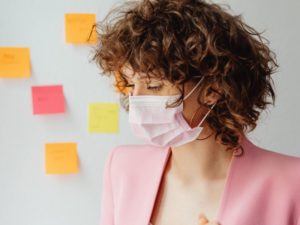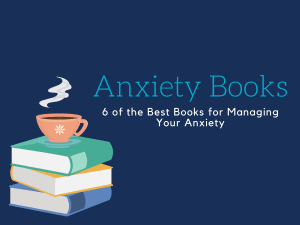For people with social anxiety, stress is a part of their daily routine. However, with the onset of a global pandemic, a new mental health condition was added to the discussion on mental health. Medical professionals have coined the term COVID-19 anxiety syndrome. This condition carries many of the physical symptoms of anxiety, including panic attacks, but also includes symptoms characteristic of obsessive-compulsive disorder.
Even though the rules are changing and mask mandates are lifting, that anxiety isn’t going away; in some cases, it could get even worse.
If your friends are starting to invite you out of the house and the thought of going out in public and meeting new people gives you a pit in your stomach, you aren’t alone. However, there are ways for you to safely begin to creep towards a new type of normal. Here are some tips to help you quell your fears, while still staying safe, so you can start to socialize without triggering debilitating anxiety.
Understanding COVID-19 Anxiety Syndrome
Before we dive in to talk about ways to manage your anxiety, let’s take a look at COVID-19 anxiety syndrome specifically.
Due to the pandemic, Americans reported a much higher percentage of mental health distress than the year before. A study performed by the CDC in June of 2020 showed that 40% of adults in the United States reported at least one form of a mental health concern. These concerns ranged from generalized anxiety, depression, heightened substance use, and suicidal ideation. With the fear of an uncertain future, a deadly virus, increased unemployment, and separation from support systems, this increase isn’t surprising.
These signs and symptoms of COVID-19 anxiety mirror those of other disorders, especially ones present during unprecedented disasters. Someone with this form of anxiety could exhibit post-traumatic stress disorder (PTSD) symptoms, but could also engage in obsessive-compulsive behaviors, such as compulsively cleaning one spot over and over. Someone with OCD isn’t just sanitizing frequently to stay healthy; something in their brain compels them to do it, because they feel that if they don’t, a disaster will occur. They could also compulsively check their symptoms; every cough can spur them into a spiral, and they can’t calm down until they get a test confirming their negative result.
COVID-19 anxiety started to plateau once scientists learned more and we established a new normal. However, now that mandates are changing once again, this new era of uncertainty will increase those levels of anxiety once again.
Practical Ways to Reduce COVID Social Anxiety
Whether you experience COVID-19 anxiety syndrome specifically, or you’re someone with generalized anxiety who feels uneasy about returning to the social scene, there are practical precautions you can take to help ease your fears and minimize the chances of a panic attack.
- If possible, get vaccinated. Knowing that you have 97% immunity against the virus can make a world of difference when going out in public. There are so many unknowns around you; who else is vaccinated? Is someone near me currently infected? You’ll feel safer for your own sake, and any guilt you feel about potentially passing the virus to a loved one will be minimized as well.
- Continue to wear a mask. Just because mask mandates are getting lifted does not mean that you need to remove yours. If your mask gives you a sense of protection and comfort, continue to wear it. Even if you’re vaccinated, it adds another layer of protection, and can almost act as a sort of security blanket. Don’t feel ashamed to continue masking up.
- Bring travel hand sanitizer with you. You can’t always control the surfaces you touch. When checking out, you’ll need to use the keypad or accept change from the cashier. Knowing you can quickly sanitize after touching these surfaces can take away a bit of the panic you might feel since you don’t know who touched these objects before you.
- Be a patron at businesses that still take the pandemic seriously. Some businesses are choosing not to remove the mask requirement. If you know that a restaurant is still taking major precautions with its waiters, bartenders, and chefs, you have an added layer of security knowing that you are not alone in the precautions you are taking.
Exercising these precautions to protect your own health can give you a sense of control. When so many factors are outside of your control, you can take comfort in the fact that you’ve done all you can to minimize your own risks.
COVID-Safe Ways to See Friends
One way to minimize your anxieties about hanging out with people again is to do so on your own terms. Even if your friends are extroverts and have been craving a night out for over a year, you don’t have to dive right in and go clubbing on your first night.
True friends will respect your fears and hesitation; just like you can appreciate that they’ve been struggling without socialization, they can understand that undergoing all these new changes again can be overwhelming for you.
The key element to successfully hanging with your friends again is communication. During the pandemic, we’ve all been guilty at one time or another of not responding to a text for weeks at a time or forgetting to call back when a friend reaches out. The trauma associated with living through a pandemic is immense, and we all have different trauma responses. If you haven’t been perfect about communicating with your friends over the last year, now is the perfect time to mend that lapse.
Apologize for being a spotty texter and explain to them where you are at emotionally. Tell them your comfort levels and what can trigger social anxiety for you; they can’t read your mind, and they can’t respect your boundaries if they don’t know what they are. Let each other know whether or not you are both vaccinated and your stance on masking up when it isn’t required.
For your first outing, do something manageable, like a pizza night at home with just one person or meeting up at an open-air coffee shop. Once you feel safe doing something small, you can try something new, like eating indoors at a restaurant or meeting with a larger group of people.
Understand That Your Social Anxiety Is Valid
With most cases of anxiety, your mind constructs unlikely scenarios for you to fear. You can manage that anxiety with treatments like cognitive behavioral therapy (CBT), which gives you tactics for assessing the likelihood of the risk. Once you determine that the fears are irrational, you can quell that intense fear and anxiety in your mind.
COVID-based anxiety isn’t like that. You can’t tell yourself that your fears are irrational; without the proper precautions like a vaccine and a mask, the chances of contracting COVID are high. Instead of telling yourself that your fears are not real, you must give yourself the license to have those fears, and then take all the precautions you can to give yourself control of the situation. Know that part of the process of overcoming social anxiety is safely facing your fears; by completely avoiding situations with any social elements, you’re only reinforcing your fear of social situations.
Follow trusted medical advice to protect yourself from COVID and communicate with your friends on how they can best help you through your symptoms of social anxiety.
Author, Artist, Photographer.
Sarah Margaret is an artist who expresses her love for feminism, equality, and justice through a variety of mediums: photography, filmmaking, poetry, illustration, song, acting, and of course, writing.
She owns Still Poetry Photography, a company that showcases her passion for capturing poetic moments in time. Instead of poetry in motion, she captures visual poetry in fractions of a second, making cherished keepsakes of unforgettable moments.
She is the artist behind the Still Poetry Etsy shop, which houses her illustrations and bespoke, handmade items. She is the author of intricacies are just cracks in the wall, a narrative poetry anthology that follows a young woman discovering herself as she emerges from an abusive relationship.
- Sarah Margaret Henryhttps://www.womensbusinessdaily.com/author/sarah-margaret-henry/
- Sarah Margaret Henryhttps://www.womensbusinessdaily.com/author/sarah-margaret-henry/
- Sarah Margaret Henryhttps://www.womensbusinessdaily.com/author/sarah-margaret-henry/
- Sarah Margaret Henryhttps://www.womensbusinessdaily.com/author/sarah-margaret-henry/






